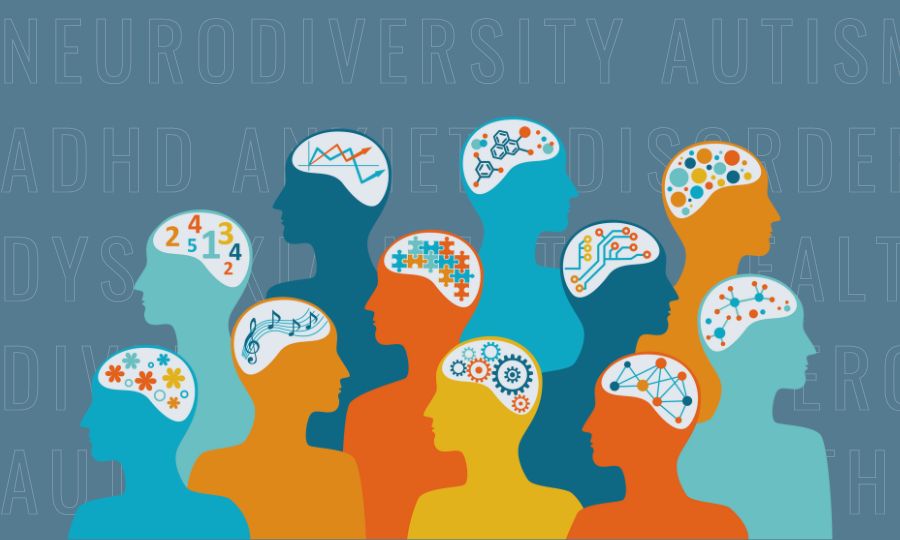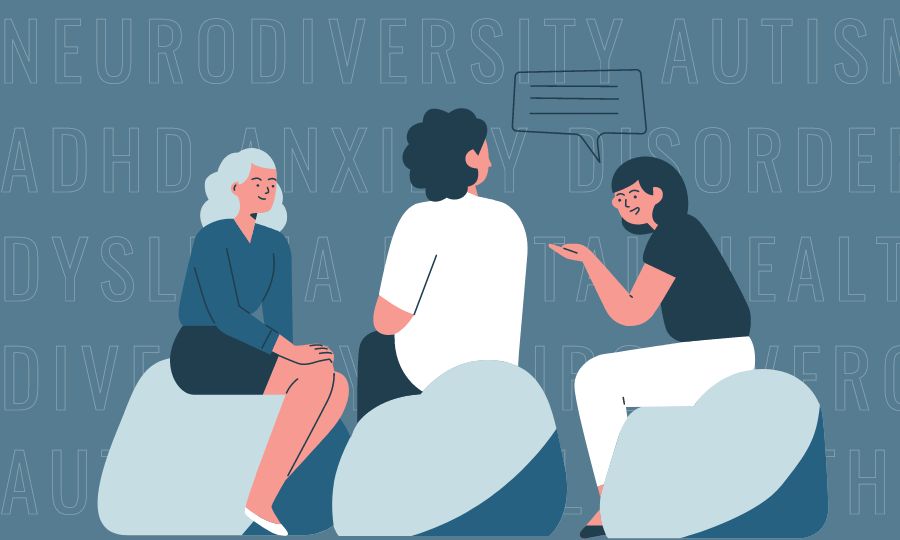Autism and Neurodiversity Awareness Month: Celebrating Differences

Insights
April is Autism and Neurodiversity Awareness Month, a time to recognize and celebrate the minds that inspire different perspectives and approaches in our lives today. Discover tips and resources for promoting inclusivity and advocating for neurodiversity at Image Engine.
Diversity is not just a buzzword – it’s a powerful tool for creativity and problem-solving. Here at Image Engine, we believe that everyone has something unique to offer, and we celebrate and promote the differences that make our team so strong.
For Autism and Neurodiversity Awareness Month, we’ve been highlighting the importance of neurodiversity by sharing information and resources with our teams. We believe that by promoting understanding and inclusion, we can create a more welcoming environment for all.
What is neurodiversity?
Neurodiversity is a broad umbrella term that refers to a variation in how people think and behave. This can include how people learn, remember information, focus, solve problems, make decisions, etc. This diversity includes conditions such as Autism, ADHD, Dyslexia, and others.
According to research, around 15-20% of the world’s population manifests a form of neurodivergence, and that diversity can bring unique strengths and challenges to different individuals.
Neurodiversity is a spectrum and shows up differently for people. Everyone has their individual experience, so we should avoid generalizations or stereotypes.
Learn more on the Harvard Health blog.
Unique skills and abilities
Neurodivergent individuals often possess unique skills and abilities that can be highly valued in various environments. For example, some individuals may have:
- Exceptional creativity and the ability to think outside the box, enabling them to generate innovative solutions for complex problems.
- A sharp eye for detail, noticing subtleties and nuances that most people would overlook.
- A high degree of empathy enabling them to connect deeply with others and display emotional intelligence in their interactions.
- High determination, resilience, and patience.
- High level of organization and productivity.
Neurodivergent individuals may also face challenges, including but not limited to sensitivity to environments, difficulty in communication, interpreting body language, organization, or concentration.

Supporting neurodivergent individuals at work
At Image Engine, we strive to create a work environment that is inclusive and supportive for all employees, regardless of their neurodiversity. Here are some tips for supporting neurodivergent individuals in the workplace:
- Use clear and concise language. Avoid using complex or abstract language, and be sure to explain any jargon or technical terms. Visual aids can also help to convey information more effectively.
- Listen actively. Take the time to listen to what neurodivergent individuals are saying and understand their perspective. Avoid interrupting or finishing their sentences for them.
- Educate yourself. Learn more about neurodiversity and the different conditions that fall under this umbrella term. This can help to dispel myths and misconceptions and create a more inclusive environment for everyone.
- Remain available. Be available to answer questions, explain processes, give instructions, and clarify guidelines to ensure employees feel comfortable communicating and doing their job.
- Provide accommodations. Some neurodivergent individuals may require accommodations, such as flexible hours, written instructions, assistive technology, or specialized equipment.
By following these tips, we can create a more inclusive and supportive workplace for all employees.
Types of neurodiversity
Find out more about some of the different types of neurodivergence.
Anxiety disorders involve more than temporary fear or worry and can worsen over time. Anxiety disorders include generalized anxiety disorder, panic disorder, social anxiety disorder, and other phobia-related disorders. Difficult social situations, systemic barriers, not being understood, and sensory environments, for instance, can increase stress and anxiety for neurodivergent individuals.
Signs of anxiety can include avoiding social situations, obsessive behaviour, difficulty sleeping, irritability, and panic attacks.
Learn more on the National Institute of Mental Health website.
Autism, also known as Autism Spectrum Disorder (ASD), is a neurodevelopmental condition that impacts brain development. Autistic people have many strengths, including attention to detail, the ability to memorize factual knowledge, focus, and great logical thinking.
Did you know that autistic people find, on average, 10% more bugs than their non-autistic colleagues when checking software code for errors? Learn more in this UCL blog post.
Attention Deficit Hyperactivity Disorder (ADHD), is a chronic neurodevelopmental condition affecting the ability to plan, focus, and execute tasks. People with ADHD can be diagnosed as predominantly inattentive, predominantly hyperactive-impulsive, or combined.
Did you know that there are three types of ADHD?
- ADHD Hyperactive-Impulsive Type
- ADHD Predominantly Inattentive Type (formally known as ADD)
- ADHD Combined Type
One of the biggest misconceptions about dyslexia is that dyslexic people have difficulty communicating. And yet, it can be one of their many strengths, as well as creativity, problem-solving, and design.
Dyslexia does not stem from a deficiency in language, word processing or motor control but is more the consequence of a unique brain processing function. Dyslexia is a brain-based condition that mainly affects the skills involved in accurate and fluent word reading, spelling, and writing.
Take care of your mental health
At Image Engine, we take mental health and well-being seriously. We encourage all our employees to take care of themselves and utilize our Employee and Family Assistance Program (EFAP) included with our benefits coverage if they need support.
Resources
To learn more about neurodiversity, check out the following resources:
- Different types of neurodivergence
- What exactly is Neurodiversity – video from How to ADHD
- La Neurodiversité France (French)
- TED talk de Arnaud Chaput – Une journée dans la vie d’un neuroatypique (French)
- The Neurodiversity Podcast
- Neurodiverging Podcast
- TILT Parenting Podcast Episode 268 – Global advocate Morénike Giwa Onaiwu
- Les Neurodivertissantes Podcast (French) – Link no longer available
Autism resources
- United Nations – The World Autism Awareness Day
- Autism Canada
- TED Talks about Autism – Suggested TED Talk: Sarai Pahla – Women and Autism. Towards a better understanding
- Meet My Brain Podcast – A Field Guide to Autism
- Oh, That’s Just My Autism Podcast
- Autism in the Adult Podcast
ADHD resources
- Jessica McCabe’s TED talk – What it’s really like to live with ADHD and YouTube channel
- Hacking Your ADHD Podcast
- The ADHD Adults Podcast
- Utopia with ADHD Girls Podcast and ADHD Girls YouTube Channel
- Abigail Agyei TED Talk – Yes, Black women have ADHD too and need your attention
- Centre for ADHD Awareness Canada
- ADHD Institute

